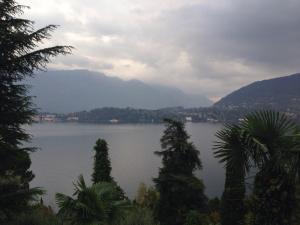Yesterday's overarching theme was: Religion und Säkularität in der Moderne (Religion and secularism in the modern world). The theme of the second day of the symposium in Cadenabbia is: Religion im Spiegel der Öffentlichkeit. The contributions are very academic and intense – inevitable, given that the contributors are university academics.
The first paper this morning was given in English by Professor Gabriel Motzkin, Director of the Van Leer Institute in Jerusalem, on the theme of Die Suche nach Gott: Zwischen Fundamentalismus und Säkularismus. His starting point was that fundamentalism is possible only where there are texts – text-based communities then use other texts to discuss (and understand) the base text. Fundamentalism replaces the world/nature with a text, this differentiating it from secularism. Therefore, the conflict between fundamentalism and secularism has essentially to do with the possibility or admissability of authoritative texts. Motzkin went on to discuss how human beings “create God”, but concluded that secularists end up with more problems here than the fundamentalists who go beyond mere human agency in the world. This was fast and furious and the ensuing discussion was rich, but it rested on a contentious assumption about terminology and (as I questioned) a confusion between 'secularism'/'atheism' and 'fundamentalism'/'theism'.

The second paper, by Dr Ahmad Milad Karimi (lecturer at the Westfälische Wilhelms-Universität in Münster), addressed the theme: Die Suche nach Gott: Zwischen westlichem und islamischen Denken. This one was in German and I didn't follow some of the complexity of terminology or argument – again, I need the text. However, the key discussion was around problems of transcendence and immanence in a context in which there is a contested assumption about revelation and/or experience.
We then moved on to Gott als Chiffre in der modernen Welt (Professor Dr Traugott Jähnichen from the Ruhr-Universität in Bochum). He basically addressed the problems and legitimacy of 'God language' in political discourse, ranging from John Locke through the (failed) preamble Lisbon Treaty to the statement that we still haven't found a form of discourse that will compensate adequately for that represented by God-talk. Speech about God (which the church must not give away) (a) imposes limits to hubris, (b) owns up to fallibility and leads to the taking of responsibility, and (c) engenders humility.
Spiritualität ohne Gott saw Professor Dr Thomas Schärtl (Universität Augsburg) define – from a philosophical perspective – both 'spirituality' (“the way in which an individual sees/commits himself to the totality of existence within the framework of meaning”) and 'religion' (“how the finite stands in relation to eternity”). He went on to offer diagnostic elements for understanding what shapes spirituality, citing such phenomena as emancipation, immanentism, expansion of choices/options, and consumerism, before looking at Christian concepts such as sin, grace and salvation.
Thinking ahead to my paper tomorrow, I am concerned about two matters that impact on how we address these concerns in the world beyond the academic/conceptual: (a) the context in Europe of common philosophical assumptions about 'neutrality' in the public square, and (b) the need for translation in a pluralist society from the language of one worldview/praxis to those of others.
I need lunch…

